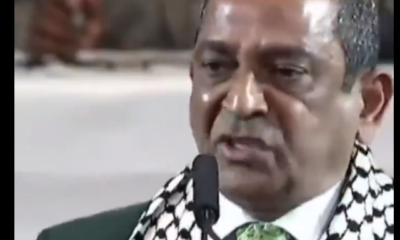
OpEds

Digging up memories among Parliament’s charred embers
Published
2 years agoon
By
Tony LeonWhen the fires swept through the Houses of Parliament on 2 January, I had many thoughts, both historical and personal.
First, I thought back on other great legislatures put to the match.
The most notorious, of course, was the Reichstag Fire in Berlin in February 1933 at the seat of the German Parliament. This act of arson by a Dutch communist (though unproved suggestions of Nazi involvement persist), Marinus van der Lubbe. The fire, which gutted the legislature, provided Hitler with the excuse to rule via decree, abolish most civil liberties, and entrench his party with an artificial majority in Parliament through the proscription of its communist members. The rest, as the following 12 years bore rueful witness, is history.
Across in Britain, its famous House of Commons, “the Mother of Parliaments” or the Palace of Westminster was largely decimated by fire in October 1834 after an act of carelessness by officials who decided to burn obsolete pieces of wood, tally sticks, in a furnace unsuited for such purpose. The resulting chimney fire ignited the woodwork, and, in quick succession, the House of Lords and St Stephen’s Chapel were destroyed, and the House of Commons devastated. And then during the war unleashed by Hitler, more than a century later, the House of Commons was set on fire by incendiary bombing, one of 14 such air raids which hit Parliament.
Of the personal, I thought back to all the history I had witnessed from the football-stadium like National Assembly: the FW de Klerk speech of February 1990; the Mandela presidential election in May 1994; and the link between those two epic events: the enactment of the Constitution two years later in 1996. Before I joined the chamber, there was, of course, the assassination in the Old Assembly in September 1996 of HF Verwoerd and back in September 1939, the fateful and narrow decision to enter World War II. The ghosts of history loomed large over the place.
My very first day in Parliament, having been elected MP for Houghton the previous September, was in fact on 2 February 1990, the day De Klerk turned South African history, and the National Party’s (NP’s) 46-year argument against it, on its head. Many other addresses followed in its wake, but few had the thermo nuclear intensity of that single 40-minute opening address.
Ironically, my last visit to Parliament, just two weeks before the fire gutted its premises, was on 12 December last year to its visitors’ centre to receive accreditation for the memorial service for De Klerk who died in November. I had no idea that 120 years of institutional and architectural history would end so soon in the fury of fire.
The editor asked for some memories, for that is what remains from the embers of Parliament’s immolation, of some of the Jewish MPs who served there. Today, South African Jews have practically disappeared from public life in the country, the fine example of veteran Gauteng MPL Jack Bloom notwithstanding, and there are likely no more than two national MPs from the tribe.
Back at the dawn of democracy here, and before then at the time of the De Klerk speech, there were many more. I was the only Jewish MP who served as leader of the opposition, but the liberal opposition cause was exceptionally well served by stand-out legislators Helen Suzman and Harry Schwarz and before the current era by Bertha Solomon and Morris Kentridge, for example.
Before the African National Congress’s advent to power, which resulted in several Jewish originating members – Joe Slovo and Ronnie Kasrils – obtaining cabinet rank and Gill Marcus being appointed a deputy minister, there were only two Jewish members of cabinet ever appointed: Henry Gluckman for the United Party before the war, and Louis Shill in the dying days of the NP government. Shill was also emblematic of an under reported aspect of the apartheid era: the fact that the Jewish community generally voted against the NP government didn’t prevent some leading members from its ranks serving as NP Members of Parliament.
If the official version, or what passes for it here amid a welter of contradictory and half-baked explanations for the fire which gutted our own Parliament, is to be believed, a single Cape Town vagrant put the National Assembly to the torch.
John Maytham, the talk radio host on Cape Talk, precisely demarcated the twin tracks on which the current catastrophe should be railed: the first is who did it and why? Was the ever-handy alibi of some destructive “third force” or “counter revolutionary” element operating as a sinister hidden hand behind the blaze?
The second track is how could it be that a national key point, the structure which houses our democratic legislature and pinnacle of our constitutional order, was so open to attack: where were the guards? Why did the fire alarm not operate? Why did no sprinklers activate to douse the flames and cauterise their spread? Why did the fire doors, recently installed, not close?
There are no ready answers to these essential questions. Or the answers to hand suggest that the immolation of Parliament is simply the latest, most destructive example of an incapacitated state, peopled by absentee incompetents, and littered with negligent disdain by the officials charged with safeguarding our vital institutions.
In a strictly political sense, our invertebrate president, Cyril Ramaphosa, is guilty of some culpability. He, either deliberately, or more likely with utter carelessness, simply allows one underperforming or grossly negligent minister or another to hopscotch from one portfolio to the next, heedless of the destruction which follows in their wake. Lacking the will or the courage to fire ministerial miscreants, he allows them to continue to re-enact their incompetence or worse at a different site of power. More concerned with retaining power than using it for the public good, Ramaphosa bares considerable blame for the decimation of the state and its finest institutions, such as the 120-year-old seat of Parliament in Cape Town.
The key figure in the parliamentary fire saga is of course the speaker of Parliament. She is charged directly with superintendence of the institution. According to Parliament’s own website, she is both the “custodian” and the preserver of “the integrity of Parliament”. The destruction of literally the bodily integrity of the legislature might on any reading be high on the list of a failure of core function for the speaker. She simply shrugged off any accountability.
History offers a voice from the past relevant to the smouldering ashes from our latest site of ruin. In 1790, reflecting on the French Revolution and its men of zeal and their destructiveness, Edmund Burke suggested: “You had all these advantages … but you chose to act as if you had never been moulded into civil society and had to begin everything anew. You began ill because you despised everything that once belonged to you. You set up your trade without capital.”
In our case this includes the Houses of Parliament, now a burnt-out memory.
- Tony Leon was a Member of Parliament from 1989 to 2009, and served as leader of the official opposition from 1999 to 2007, the only Jewish South African to occupy this office. He was leader of the Democratic Alliance and Democratic Party from 1994 to 2007.










